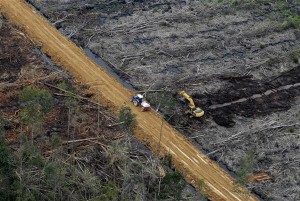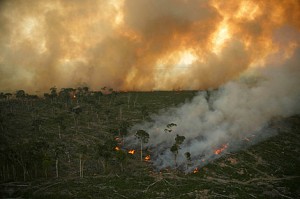
Sinar Mas Group, the notorious international palm oil pariah, recently made a remarkable announcement: The company’s subsidiary, Golden Agri Resouces (GAR), intends to implement a forest conservation policy. Among other things, GAR’s Forest Conservation Policy commits it to a goal of “no new development” on peat lands, High Conservation Value Forest areas or High Carbon Landscapes, respecting Indigenous and local communities, and achievement of RSPO certification for all its holdings by 2015.
Well, sounds good on paper, right?
The announcement is significant for several reasons. First, it demonstrates that global grassroots market pressure campaigns are working. When Indonesia’s largest palm oil producer — whose environmentally and socially egregious production practices have made it the poster child of everything that is wrong with the palm oil industry — announces its intention to move, it’s clear that our message is starting to get through. GAR’s announcement follows years of worldwide negative press and international contract cancellations, most recently from major high-profile companies including General Mills, Burger King, Nestle and HSBC.
Second, while the announcement recycles a number of previous GAR commitments, it is the first time a major palm oil supplier has set clear criteria defining High Carbon Landscapes (HCL). This is a hugely important benchmark for the entire palm oil industry in Indonesia as well as for the pulp and paper sector. (Interestingly, Sinar Mas Group also owns the largest and most notorious pulp and paper producer in Indonesia, Asia Pulp and Paper.) The RSPO needs to include this benchmark in its standards, and it deserves to also be embraced and codified by the government as it moves forward with actions to reduce deforestation — including the upcoming moratorium on forest conversion expected from the President Susilo Bambang Yudhoyono.
Carbon emissions from massive corporate-led deforestation and peatland destruction in Indonesia have vaulted it to a third place ranking as the world’s largest greenhouse gas emitter after China and the US. GAR’s HCL criteria are set at a “provisional 35 tons of carbon per hectare,” which should take most valuable standing forest off the table and shift expansion to more degraded lands. GAR, working with forest consultants Tropical Forest Trust, will be doing a study to assess this benchmark over the next 6 months.
 Most importantly, however, is what GAR’s announcement says about Cargill.
Most importantly, however, is what GAR’s announcement says about Cargill.
If GAR is willing to step forward and make such overdue commitments publicly, why isn’t Cargill doing the same for its palm oil business? Cargill needs to clean up its palm oil supply chain and insist on what GAR is promising from ALL of its palm oil suppliers (as well as on Cargill’s own palm oil plantations). Cargill trades an estimated 20-25% of global palm oil production. As long as Cargill continues to trade in unsustainably produced palm oil, the company is a huge part of the problem.
In a recent article dissecting GAR’s new policy, CSR veteran David Logan, who is tasked with helping usher GAR into 21st Century corporate social responsibility, notes that he’s making sure GAR has a vested interest in improved transparency. Wait a minute, did he say Transparency? What a concept for a massive palm oil company! The kind of transparency he’s advocating is exactly the type of consistent public reporting we’re looking for in a Cargill policy.
Taken just at face value, GAR’s commitments represent a positive signal, both for the company and more widely for the palm oil industry. When even a palm oil pariah like GAR says it will go to bat for forest protection, other major palm oil players like Cargill are going to have to get more serious about their commitments to clean up their palm oil business.
Join our campaign to get Cargill to implement a palm oil policy that ensures that all the palm oil they purchase and trade doesn’t come from rainforest destruction or slave labor, whether from third party suppliers or Cargill’s own plantations — where the company is both destroying the rainforest and abusing worker’s rights.
Sign our petition and ask Cargill to show real leadership in making sure that rainforests aren’t cut down for palm oil.
One last thought: As Mr. Logan raised in his discussion about GAR’s uphill journey towards corporate social responsibility, GAR’s new policy announcement begs us to revisit an important question about the RSPO. If one of the worst players in the industry has essentially committed to surpass the RSPO’s principles and criteria, that calls into question whether or not the RSPO — the only certification criteria that commands any significant percent of the palm oil market — has strong enough standards to make a real difference on the ground in Indonesia.